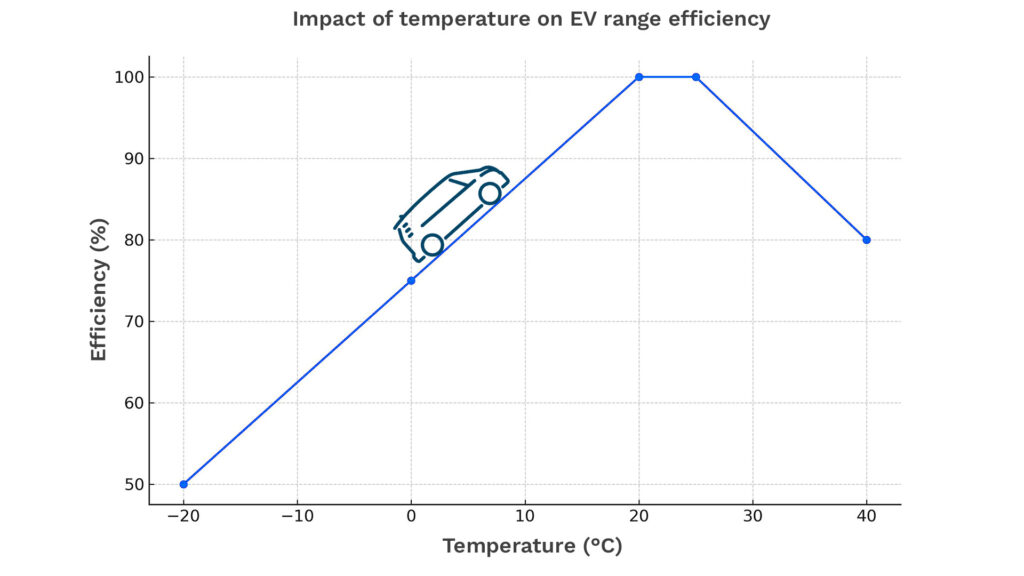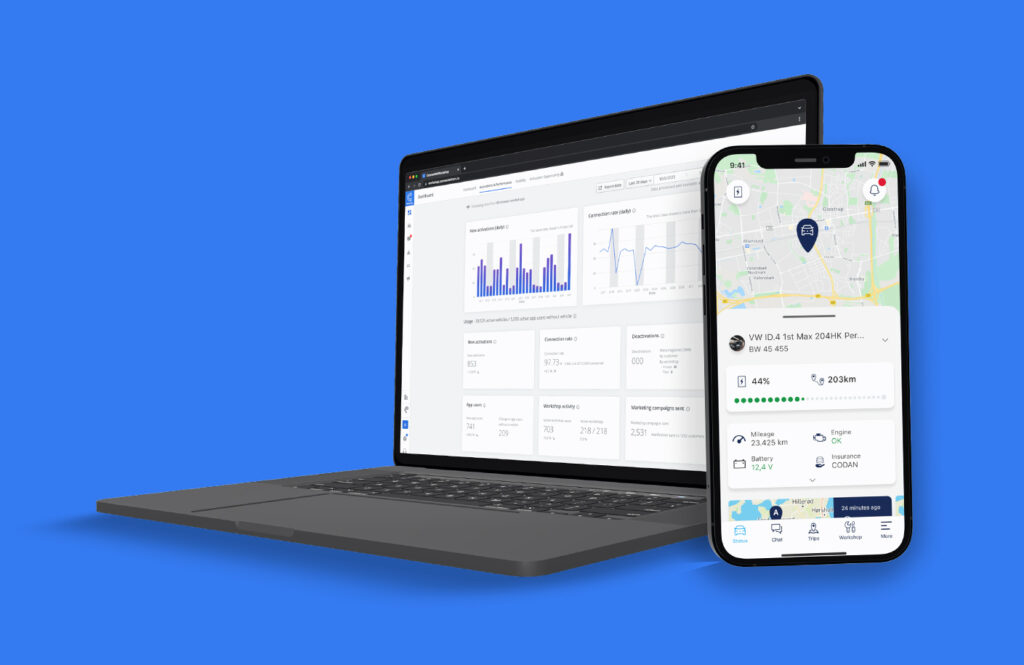The rise of electric vehicles (EV) presents you, as an importer, dealer group, or leasing company, with a unique set of challenges and opportunities. Temperature’s impact on your EV battery range is a critical factor affecting the efficiency of your fleet and the satisfaction of your customers. This article is designed to give you focused insights and strategies to optimize your EV fleet operations, boost your profitability, and uphold high service standards, even in the face of weather extremes.
The science behind temperature and your EV range
Grasping the effects of temperature fluctuations on the performance of your electric vehicles (EVs) is key to managing your fleet efficiently. Your EVs operate best between 20°C and 25°C (68°F to 77°F), with their performance declining outside these parameters due to shifts in lithium-ion battery chemistry, pivotal for energy storage and release. In cold temperatures, the battery’s electrolyte solution thickens, impeding lithium-ion movement, which diminishes battery capacity and your vehicle’s range. Additionally, the energy expended to heat the vehicle in cold conditions further drains the battery power available for propulsion. On the flip side, high temperatures spur battery degradation through increased unwanted chemical reactions, curtailing capacity and shortening battery life. The cooling systems needed to counter these effects also use up energy, thereby reducing your EV range.

EPA and WLTP range tests often overestimate the real-world range of EV fleets, failing to consider temperature impacts. Advanced fleet management systems are essential to maintain battery temperatures within optimal ranges, ensuring efficient operation and reducing maintenance costs. This approach enhances vehicle efficiency, extends battery life, and improves overall fleet performance, aligning it more closely with actual driving conditions.
EV fleet range in different temperatures
Managing your fleet effectively in various climates means strategically utilizing your vehicles and leveraging data analytics models to lessen the temperature’s effect on your electric vehicle (EV) range. By adjusting vehicle use to temperature conditions that favor optimal battery performance, you can improve vehicle range, battery health, and the overall productivity of your fleet. The incorporation of real-time battery data for dynamic operational planning is essential for adjusting to the variability in range caused by climate conditions, helping your fleet stay resilient and efficient, no matter the weather extremes. Preconditioning your vehicles while they’re plugged into chargers is a crucial approach, significantly lowering the energy required for temperature management when on the move, thus conserving the real range and increasing passenger comfort.

Furthermore, the ability to quickly find the nearest charging infrastructure, is especially vital for keeping your batteries in prime condition under less than optimal weather conditions. These approaches not only elevate operational efficiency across varied climates but also highlight your commitment as a fleet operator to sustainable and skillful fleet management. By proactively tackling the challenges brought about by fluctuating temperatures, you can uphold superior service quality, placing your operations at the forefront of eco-friendly and effective fleet management techniques.
Enhancing efficiency of your EV fleet across climates
The financial impact of temperature on your electric vehicles (EVs) extends beyond the immediate costs of operation, significantly influencing the long-term returns on investment and the management of your vehicles’ lifecycles. The upfront expenses of acquiring an EV fleet are increased by the need for integration with charging networks and EV knowledgeable workshops. Then extreme temperatures only add to the cost of regulating optimal battery usage for the lowest possible daily operational costs. Moreover, your strategic investments in smart charging infrastructure can mitigate peak demand charges and boost battery longevity, key factors in optimizing your EV fleet’s financial efficiency. These actions guarantee that operational savings are maximized throughout the vehicle’s lifespan, increasing residual value for leasing companies, and solidifying the economic argument for transitioning to electric mobility.

From a revenue perspective, an efficient and meticulously maintained fleet greatly enhances customer satisfaction and loyalty, which are vital for encouraging repeat business and building a strong brand image. The resale value of your EVs, greatly affected by the health of the battery and the overall condition of the vehicle, highlights the significance of adept temperature management strategies. These strategies not only preserve vehicle performance and range but also increase the fleet’s residual value by extending battery life. As the market for used EVs expands, keeping a fleet that is both efficient and in excellent condition provides a notable competitive advantage, underscoring the importance of thoroughly managing temperature effects in your financial planning for EV fleet operations.
Transforming your EV fleet operations with Connected Cars
Connected Car technologies are improving how you manage your fleet operations by providing real-time insights into each vehicle, an advantage especially crucial for addressing the challenges posed by temperature fluctuations on your EV fleets. With features in the Connected Cars app like an interactive map to locate the nearest charging stations and live monitoring of each vehicle’s battery state of charge, you can plan routes more efficiently, alleviate range anxiety, and guarantee operational uptime. This makes your operations run smoother and also boosts user experience and vehicle range, leading to increased customer satisfaction. Adopting Connected Car technology enhances your operational efficiency and enables proactive adjustments to your fleet’s needs, signifying a leap forward in service reliability and management prowess.

Incorporating Connected Car solutions into your EV fleet management tackles the distinct challenges of electric vehicles by optimizing routes, managing batteries, and utilizing advanced data analytics for proactive maintenance. By examining energy consumption patterns and how temperature affects battery performance, you can refine your operations, achieving cost savings, diminishing environmental footprint, and enhancing the driving experiences of your customers. This forward-thinking approach establishes a new benchmark in the industry, providing you with the tools needed to adeptly navigate the intricacies of modern EV fleet management and attain unparalleled levels of efficiency and customer satisfaction.
Conclusion: Navigating the future of EV fleets
As the electric vehicle (EV) market expands, your role as an importer, leasing company, or dealer group involves mastering the complexities of how temperature affects EV range through strategic insight and the adoption of innovative technologies. Understanding the science, mastering fleet management, and leveraging telematics are essential in the competitive automotive industry, especially with the rise of the agency model. These efforts will enable you to fine-tune your fleet operations, elevate customer satisfaction, and achieve success in the changing automotive landscape. Embrace these strategies and tools to guide your fleet towards greater efficiency and resilience, whatever the climate may throw your way.
Contact us to discover how we can assist your business in any climate during the era of electric mobility.






